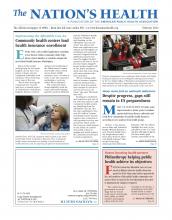Living with a condition such as diabetes or heart disease can be difficult.
But there’s an easy way to chart a course for better health and possibly avoid such diseases: preventive health screenings and services.
Health professionals administer preventive screenings and services to assess and reduce your risk for diseases and conditions such as high blood pressure.
Making sure you’re up to date on preventive services is one of the most important things you can do to stay healthy, says Anand Parekh, MD, MPH, deputy assistant secretary for health in the U.S. Department of Health and Human Services, who focuses on science and medicine.
There are many preventive services all adults should be getting regularly. The most common preventive services for adults fall under three categories: cancer screenings, cardiovascular disease screenings and immunizations.
For cardiovascular health, adults should have a health professional check their blood pressure levels at least every two years and their cholesterol levels at least every five years, according to HHS. These screenings are important because they can be indicators of cardiovascular disease. The earlier a physician sees the levels rise, the earlier you can reverse them with lifestyle changes, such as a healthier diet and more exercise. A physician can also let you know whether you need additional screening.
All adults should be screened for colorectal cancer beginning at age 50, or earlier if there’s a family history, according to HHS. Getting screened for colorectal cancer, which affects the rectum and colon, is key because it’s the second most deadly cancer to affect both women and men, according to the Centers for Disease Control and Prevention.

Photo courtesy iStockphoto: woman on scale, Phillip Spears
When it comes to immunizations, everyone 6 months of age and older should get a flu shot each year. But other immunizations run on different timelines. While you may get vaccinated against bacterial infections, such as tetanus and diphtheria, as a child, you are encouraged to get a booster shot for those illnesses every 10 years as an adult, according to HHS. Seniors age 65 and older should also be vaccinated against pneumonia, as older people are more vulnerable to the respiratory disease.
What screenings are right for you?
There are many preventive screenings geared toward all adults, checklists for which are available online from HHS or from your doctor. But some exams are specifically geared toward certain types of people.
For example, HHS recommends 22 preventive services specifically for women’s health. Beginning at age 40, women should talk with their physicians about when to get mammograms — which are X-rays of the breasts that can detect or predict a risk for cancer. From ages 50 to 74, women should get mammograms every two years, though your doctor may recommend screenings earlier based on your personal risk factors. Nearly 200,000 women are diagnosed with breast cancer annually in the U.S. and 40,000 women die from it. But a woman’s risk of dying from breast cancer can drop substantially with regular mammograms, according to CDC.
The Pap test — in which a physician examines cervical cells for abnormalities — is recommended for women every three years between ages 21 and 65 to detect cervical cancer, according to HHS. There’s also a DNA-based test to screen for viruses that are linked to the cancer.
“The whole idea is to do even better in terms of early screening detection of cervical cancer,” Parekh says.
Men also have certain screenings aimed at them. If you’ve ever smoked and you’re a man who is between ages 65 and 75, you should be screened for abdominal aortic aneurysm risks. The abdominal aorta, the largest artery in the abdomen, can be weakened by smoking.
When it comes to preventive care for children, immunizations, such as for the measles and whooping cough, are the most critical in terms of cost savings and reducing disease and mortality rates. Overall, there are 26 preventive care services — including immunizations — for children. Screenings are recommended often as the child grows, such as for blood pressure and behavioral development. Others are specifically for newborns, children and adolescents.
You should check with your health care provider about what preventive screenings are available to you. Under new changes to U.S. law, most health insurance plans are now required to cover such screenings at no cost.
“We’re aiming to see many many Americans receiving these services that are important to their health,” Parekh says.
Preventive screenings save money
In the long run, it’s more cost effective to take steps to prevent disease than pay for treatments. As much as $3.7 billion in medical costs could be saved annually in the U.S. if preventive screenings increased by 90 percent, according to the U.S. Office of the Surgeon General.
- Copyright The Nation’s Health, American Public Health Association









